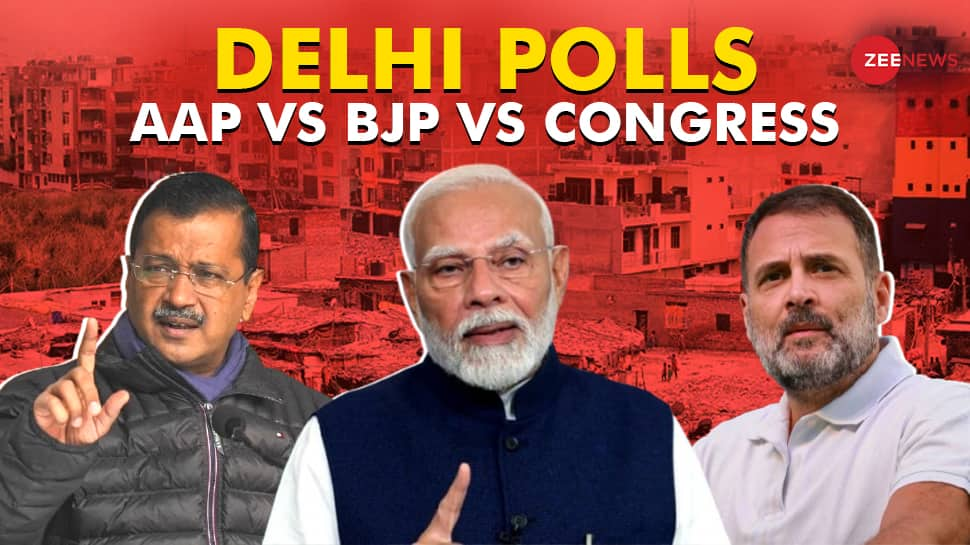New Delhi: The 27-day high voltage campaigning for the February 5 Delhi Assembly polls saw an intense battle of nerves as big guns –AAP, BJP and Congress — sparred over a range of issues, including “Sheesh Mahal vs Rajmahal”, “poisonous Yamuna”, “Bin Dulhe Ki Barat,” freebies, and personal attacks.
The parties carried out public meetings, rallies, roadshows and padyatras, right after the announcement of poll schedule on January 7.
The bigwigs, including Prime Minister Narendra Modi, AAP supremo Arvind Kejriwal and Congress’s Rahul Gandhi, led the race to power in the national capital.
The high pitched campaigning was dominated by intense blame-game among the three major parties, with BJP and Congress using “Sheesh Mahal” and “liquor scam” to attack Kejriwal.
The AAP hit back at the BJP, alleging breakdown of law and order under Union minster Amit Shah, and lasso in the party over the expense on Prime Minister’s residence, calling it “Raj Mahal”.
While governance, law and order, and women’s welfare remain crucial, political narratives largely shaped the campaigning.
Freebies ruled the roost in poll manifestos of all the three parties, with each promising a monthly grant of Rs 2,100-2,500 to women, free treatment for elderly, and free units of electricity.
The AAP and BJP sparred seriously to woo their votaries and gain some more, with the former promising monthly payments to temple priests and gurdwara granthis, bus rides, and schemes for youth, students and auto-taxi drivers.
The Congress and the BJP promised cooking gas cylinders at Rs 500. The BJP also promised Rs 21,000 for expecting mothers, while Congress promised Rs 8,500 per month to unemployed youth.
During his rallies, PM Modi made a pitch for the removal of the ruling AAP from power in Delhi, calling it as “AAP-da” (disaster) for the city.
The AAP returned the favour terming BJP as “Gali Galauj Party,” citing alleged “abusive language” of its leader Ramesh Bidhuri.
A controversy arose over Bidhuri allegedly using derogatory reference to Congress leader Priyanka Gandhi Vadra and Atishi, Delhi chief minister and his rival in Kalkaji constituency.
AAP supremo Kejriwal landed in a controversy over his remark that the BJP government in Haryana “mixed poison” in the Yamuna water coming to Delhi to attempt “genocide” in the city. A defiant Kejriwal accused the BJP hatching a “conspiracy” to create a water crisis.
Congress leader Ajay Maken invited the ire of the AAP for terming Kejriwal “anti-national”. The AAP threatened to approach other INDIA bloc parties to get Congress removed from the grouping.
Another controversy arose as a team of poll officials sought to search Punjab Chief Minister Bhagwant Mann’s Kapurthala House residence in Delhi.
A week before the campaigning came to close, the AAP accused the BJP and Shah of resorting to hooliganism to win the polls.
The BJP in its turn claimed Kejriwal was “frustrated” over an imminent defeat on his New Delhi seat and losing power in Delhi.
Kejriwal mounted an attack on the BJP, Election Commission and Delhi Police, alleging a collusion to subvert the electoral process and prevent AAP from campaigning. Both BJP and AAP accused each another of deletion and addition of votes.
The BJP charged that AAP was trying to register Bangladeshi and Rohingya infiltrators in Delhi to become voters.
The AAP charged that the BJP workers were filing large number of applications to get party supporters’ votes deleted in different constituencies.
In a name calling spree, the BJP dubbed Kejriwal as “Mahathug”, “Chunavi Hindu”, Ghoshna Mantri” through slogans and AI-generated spoofs on social media.
The AAP derided the BJP campaign as “Bin Dulhe Ki Barat” (wedding party without groom) over its not having a chief ministerial face. The party also accused BJP candidate Parvesh Verma, pitted against Kejriwal in New Delhi seat, of distributing money to women and goodies like shoes, jackets, sarees and blankets.
The parties also sought to woo Purvanchali voters, one of the biggest regional vote bank in Delhi, promising them grand Chhath Puja celebrations and releasing Bhojpuri campaign songs.
With 699 candidates contesting across 70 constituencies, the Delhi elections are being seen as a referendum on AAP’s governance model as well as future of the BJP and Congress in Delhi for the next five years.
The results on February 8 will determine whether AAP secures a third consecutive term or if BJP and Congress can make a significant comeback in the national capital.

